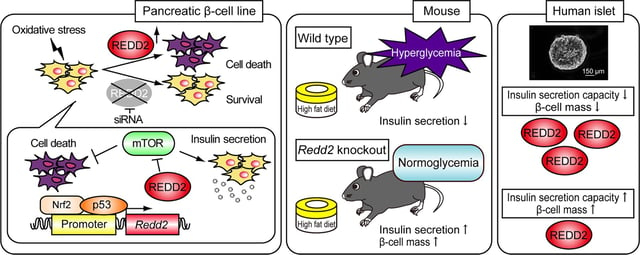Overview
- Exposure to high glucose, fatty acids and diabetogenic agents markedly upregulates REDD2 transcription in pancreatic β-cells
- Experimental knockdown of REDD2 preserves insulin secretion and enhances β-cell survival under metabolic strain
- REDD2-deficient mice fed a high-fat diet or treated with diabetes-inducing chemicals maintain better blood sugar control and β-cell mass
- Analysis of human islet cells reveals higher REDD2 levels correlate with reduced β-cell functional capacity
- Targeting REDD2 with small molecule inhibitors, genetic methods or functional dietary components offers a novel strategy to prevent or delay type 2 diabetes
